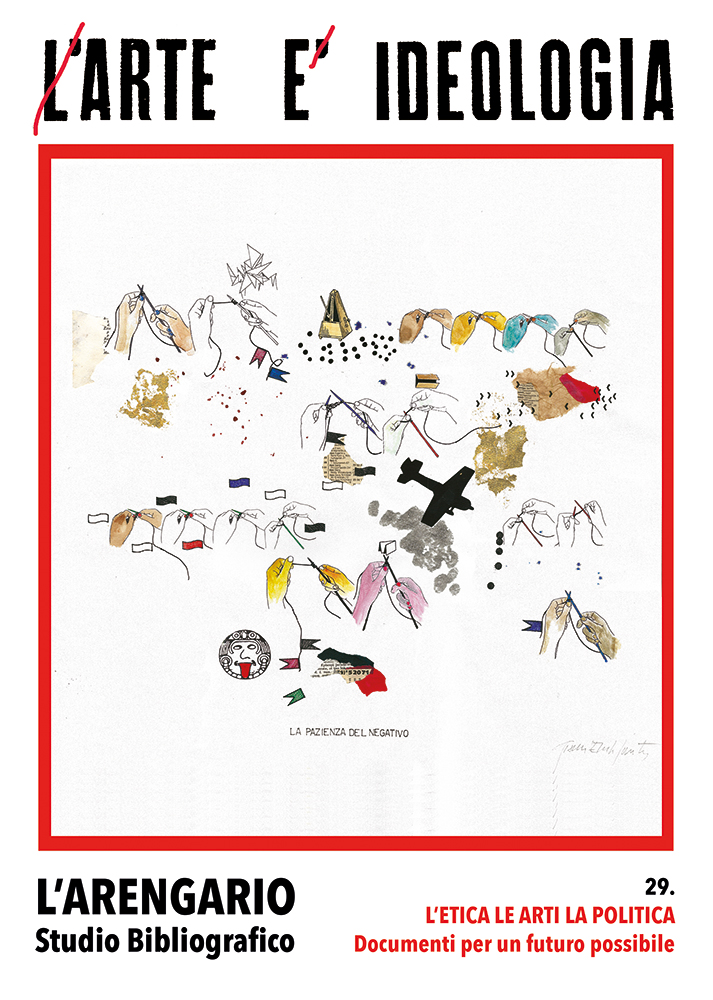L'ARENGARIO STUDIO BIBLIOGRAFICO - Dott. Paolo Tonini
L'etica le arti la politica. Documenti per un futuro possibile
Luogo: Cellatica
Editore: L'Arengario Studio Bibliografico, "Arte e ideologia 29"
Stampatore: prodotto in proprio
Anno: 2024 (23 dicembre)
Legatura: brossura
Dimensioni: 29,7x21 cm.
Pagine: pp. VIII - 67 (3)
Descrizione: copertina illustrata con la riproduzione a colori di un'opera di Gianni Emilio Simonetti («La pazienza del negativo»). Catalogo illustrato a colori, 67 schede ragionate a cura e con un testo di Paolo Tonini («Etica ed estetica - la pazienza del negativo)» / «Ethics and Aesthetics - the patience of the negative»). Edizione digitale.
Bibliografia: N. D.
Prezzo: N. D.ORDINA / ORDER
"«Per quanto voi vi crediate assolti / Siete per sempre coinvolti»" (Fabrizio De André). Senza etica le arti sono povera cosa. Ma l’etica implica una assunzione di responsabilità, costa tempo e fatica, coerenza, dolore. D’altra parte senza etica l’impegno politico è un ridicolo “mi piace” sui social, un’opinione. Se l’etica, secondo un’antica definizione, è la percezione di quel che è buono, l’estetica è il sentimento del bello: ma buono e bello stanno tra loro in un rapporto dialettico perché anche il male può esser bello e il buono può provocare il male - il negativo esiste, per fortuna. L’opera d’arte, come qualunque opera di poesia, può mettere insieme tutto questo, è capace di comprendere e sopportare il negativo, non emette giudizi, induce a pensare, e a dubitare. Ma quale artista, quale poeta oggi è disposto a pagare per questa responsabilità?" (A proposito della mostra Warhol Banksy 20/12/2024).
"«Though you may believe yourselves absolved / You are forever involved» (Fabrizio De André). Without ethics, the arts are a poor thing. But ethics involves taking responsibility - it demands time, effort, consistency, and pain. On the other hand, without ethics, political commitment becomes a ridiculous “like” on social media, an opinion. If ethics, as an ancient definition suggests, is the perception of what is good, aesthetics is the feeling of what is beautiful. But good and beautiful exist in a dialectical relationship because evil can also be beautiful, and good can provoke evil - the negative exists, fortunately. A work of art, like any poetic creation, can bring all this together. It can embrace and endure the negative, refraining from judgment while prompting thought and doubt. But which artist, which poet today is willing to pay the price for this responsibility? (About the Warhol Banksy exhibition 20/12/2024).
DOWNLOAD PDF FILE
"«Though you may believe yourselves absolved / You are forever involved» (Fabrizio De André). Without ethics, the arts are a poor thing. But ethics involves taking responsibility - it demands time, effort, consistency, and pain. On the other hand, without ethics, political commitment becomes a ridiculous “like” on social media, an opinion. If ethics, as an ancient definition suggests, is the perception of what is good, aesthetics is the feeling of what is beautiful. But good and beautiful exist in a dialectical relationship because evil can also be beautiful, and good can provoke evil - the negative exists, fortunately. A work of art, like any poetic creation, can bring all this together. It can embrace and endure the negative, refraining from judgment while prompting thought and doubt. But which artist, which poet today is willing to pay the price for this responsibility? (About the Warhol Banksy exhibition 20/12/2024).
DOWNLOAD PDF FILE

